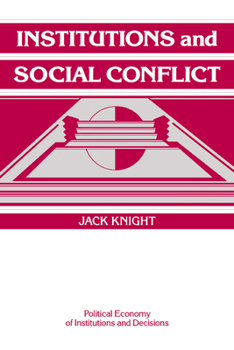Institutions and Social Conflict
(Part of the Political Economy of Institutions and Decisions Series)
Select Format
Select Condition 
Book Overview
Many of the fundamental questions in social science entail an examination of the role played by social institutions. Why do we have so many social institutions? Why do they take one form in one society and quite different ones in others? In what ways do these institutions develop? When and why do they change? Institutions and Social Conflict addresses these questions in two ways. First it offers a thorough critique of a wide range of theories of institutional change, from the classical accounts of Smith, Hume, Marx and Weber to the contemporary approaches of evolutionary theory, the theory of social conventions and the new institutionalism. Secondly, it develops a new theory of institutional change that emphasises the distributional consequences of social institutions. The emergence of institutions is explained as a by-product of distributional conflict in which asymmetries of power in a society generate institutional solutions to conflicts.
Format:Paperback
Language:English
ISBN:0521421896
ISBN13:9780521421898
Release Date:October 1992
Publisher:Cambridge University Press
Length:252 Pages
Weight:1.10 lbs.
Dimensions:0.7" x 6.0" x 9.0"
Customer Reviews
0 rating





